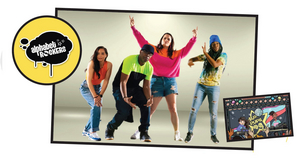Grammy Winners Alphabet Rockers To Perform at UC Berkeley On February 20
The Lawrence uses animation and hip-hop to teach kids science.

A new video series created by The Lawrence Hall of Science uses animation and hip-hop music to introduce concepts like data, privacy, and trust to kids ages 6-10. Designed to scaffold basic science, technology, engineering, and math (STEM) concepts for underserved kids, the Tuff Pupil series features Oakland's four-time Grammy-nominated Alphabet Rockers, who collaborated on the songwriting and provided the voices of the main characters.
"What if we did a hip-hop Schoolhouse Rock about science?" asked Rena Dorph, Executive Director of The Lawrence. "The more the idea came up, the more I thought about Alphabet Rockers," said Sarah Lefton, Director of Digital Media. "I was already a fan, and it seemed like a match made in heaven."
On Sunday, February 5, Alphabet Rocker's latest album, The Movement, won the Grammy for Best Children's Music Album, which includes songs about transformative justice and community building. The newly-minted Grammy winners will bring their uplifting music to The Lawrence on UC Berkeley's campus with joyous homecoming concerts celebrating their Grammy win and the Tuff Pupil series on Presidents Day, Monday, February 20, a $5 admission day.
Led by Kaitlin McGaw and Tommy Soulati Shepherd, Alphabet Rockers is a performance collective making empowering music rooted in the community and centers on children's voices, like teens Kali de Jesus, Tommy Shepherd III, and Maya Fleming. The group will perform music from Tuff Pupil and The Movement.
Tuff Pupil was born out of a National Science Foundation (NSF) grant to the UC Berkeley Department of Electrical Engineering and Computer Science. Investigators John Kubiatowicz, Ken Goldberg, Anthony Joseph, and Joseph Gonzalez conducted research into technical solutions for specific data security issues. Like all NSF grant recipients, they were required to incorporate a "broader impacts" component into their project, demonstrating a societal benefit to their research. When they approached The Lawrence to collaborate on broader impacts, together they landed on creating a tool for kids to learn data security.
"Teachers and parents aren't necessarily provided the tools and instructional materials needed to help their students make sense of and understand data security and why it matters," said Tim Hurt, Computational Science Education Lead at The Lawrence. "We wanted to develop a resource to help kids better understand what data security is, how it can impact them, and why they should take control of their own data."
In Tuff Pupil, the main characters, Flori and Taye, are high school students and best friends who write and perform music together as the electronic hip-hop duo Tuff Pupil. After school, they make music about the technology and science they encounter in their lives that they think other kids should know about. Each 5-minute episode demystifies an everyday phenomenon-how stores can predict your order or how online radio seems to always play the song you were dying to hear.
"We worked to identify high-level themes that would be most useful and understandable for our target audience of kids around eight years old," said Hurt. "We then pinpointed three concepts for our first episodes that kids could understand and that hopefully would help them be more aware and thoughtful in their online interactions: 'That's Data' (Episode 1), 'Trust' (Episode 2), and 'Privacy Smart' (Episode 3)."
With so many science topics that will become essential to young people's lives, from data science to climate disruption to artificial intelligence, producers of Tuff Pupil hope to secure funding to develop more episodes. The Lawrence envisions the series as creating a music-centered STEM life skills toolbox for elementary students.
The Lawrence Hall of Science is UC Berkeley's public science center and a learning lab-a place where world-class researchers engage with key questions and major challenges that face the field of science, technology, engineering, and math education. The Lawrence's mission is to inspire and engage through scientific discovery and learning to advance equity and opportunity.
Since 1968, The Lawrence has inspired tomorrow in local, national, and global communities with innovative and engaging learning experiences. Each year, the work of The Lawrence Hall of Science reaches 12 million young people, through its standards-based curriculum and model programs for learners and educators, in schools, museums, and informal learning spaces in all 50 states and across the globe.
Comments

Videos

